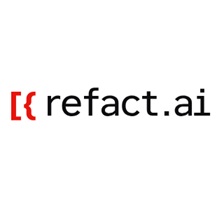Agentic AI Comparison:
Codex CLI vs Refact.ai
Introduction
This report presents a detailed comparison between Refact.ai and Codex CLI, two advanced AI-powered coding agents. The evaluation focuses on five key metrics—autonomy, ease of use, flexibility, cost, and popularity—to provide a comprehensive view for developers and organizations considering their adoption.
Overview
Refact.ai
Refact.ai is an advanced AI coding assistant designed to enhance developer productivity by integrating directly into popular IDEs. It offers features such as intelligent code completion, real-time suggestions, automatic refactoring, and adaptive recommendations based on the target codebase. Refact.ai supports fine-tuning for personalized assistance and offers secure on-premise deployment, catering to enterprise needs.
Codex CLI
Codex CLI is a terminal-based, open-source agentic coding assistant built by OpenAI. It enables natural language interaction with local codebases, manages tasks through shell commands and code edits, and operates within a sandboxed, git-backed workspace. Its architecture emphasizes safety, precision, and session tracking, and offers seamless integration with local development workflows. Codex CLI is lightweight and targets users comfortable with terminal interfaces.
Metrics Comparison
autonomy
Codex CLI: 7
Codex CLI acts as a highly interactive assistant capable of resolving queries through code edits, command execution, and function calls. It continues until the user's coding query is solved but typically requires explicit user approval and oversight, limiting full autonomy compared to Refact.ai.
Refact.ai: 9
Refact.ai can plan, generate, test, and deploy code autonomously, adapting to the project's structure and integrating with other development tools. Its end-to-end engineering capabilities and organizational memory set a high standard for autonomy.
Refact.ai surpasses Codex CLI with broader autonomous capabilities, especially in end-to-end software development and integration.
ease of use
Codex CLI: 6
Codex CLI operates from the terminal and is best suited for those comfortable with command-line interfaces. While powerful for technical users, its usability presents a steeper learning curve for less experienced developers.
Refact.ai: 8
Refact.ai integrates directly into mainstream IDEs like VS Code and JetBrains, providing an intuitive experience for most developers. Its seamless in-IDE workflow minimizes context switching and is accessible to users at various skill levels.
Refact.ai offers easier onboarding and everyday use for a broader segment of developers compared to the more technical Codex CLI.
flexibility
Codex CLI: 7
Codex CLI is adaptable within local codebases and terminal environments, supporting custom workflows and permissions. However, it lacks direct integration with graphical IDEs, limiting its applicability in some organizational settings.
Refact.ai: 9
Refact.ai supports major IDEs, enables codebase-specific fine-tuning, and offers both cloud and on-premise deployment. It adapts to team coding styles and complex enterprise workflows, making it versatile for various use cases.
Refact.ai's IDE integration and enterprise features provide greater flexibility, especially for diverse development environments.
cost
Codex CLI: 8
Codex CLI is open-source and generally incurs no licensing costs. Users may incur model usage fees (e.g., OpenAI API access), but the CLI itself is lightweight and cost-effective, especially for those leveraging open models.
Refact.ai: 9
Refact.ai offers a free plan for individuals and competitive enterprise pricing significantly lower than alternatives, especially for features like team-wide customization and organization-level functionality.
Both tools are inexpensive to adopt, though Refact.ai may be more advantageous for enterprises, while Codex CLI’s open-source nature benefits cost-conscious individual or small team users.
popularity
Codex CLI: 7
Codex CLI, as a terminal-first, open-source agent, appeals to technically skilled developers and those in the open-source community. Its user base is active but specialized, with growing interest as the technology matures.
Refact.ai: 7
Refact.ai is gaining traction, especially in enterprise environments and among users who prioritize integration and security. However, it is not as widely recognized as some industry leaders yet.
Both agents are popular in their niches, but neither has reached mainstream recognition on the scale of products like GitHub Copilot.
Conclusions
Refact.ai and Codex CLI each offer strong value as AI coding agents, but their strengths cater to different audiences. Refact.ai excels in autonomy, flexibility, and ease of use due to deep IDE integration, advanced workflow automation, and enterprise readiness. Codex CLI stands out as a lightweight, open-source solution favored by terminal users seeking low costs and highly interactive coding support. Organizations prioritizing integration and team productivity may favor Refact.ai, while individuals or small teams comfortable with command-line tools and open-source models may prefer Codex CLI.

